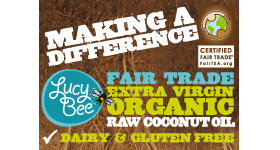|
|
|
|
Since the beginnings of human culture, we've been nourished by fermented food – bread, coffee, chocolate, cider, yogurt and sauerkraut are amongst the most familiar. In fact, only those countries that retain their traditional cultured foods are considered cultured, e.g. France with its wines and cheeses and Japan with its miso, tempeh, natto & fine fermented teas. Unfortunately, most western countries have mucked about with these traditional, fermented foods, converting them into a long list of bland, processed foods. These vital foods, with their enhanced nutrition, packed with probiotics and digestive enzymes are at the forefront of the “food as nutrition” movement. They provide incredible health benefits and are also fun and easy and cost little to make. The practice is kind of like the farming of friendly microbes whilst you tend to your bubbling crocks of fermenting raw vegetables! Sandor Ellix Katz visits London for a fermentation workshop, July 18th all the way from his eco-community in Tennessee. Sandor is a a self described “fermentation fetishist”. If you come to participate in his workshop or choose to read his book “Wild Fermentation”, get ready to take a whirlwind trip through the wild world of fermented and live cuisine! For details, visit culturedprobiotics.co.uk or call Philip on 02076821093. You can read Sandor's blog at wildfermentation.com Sandor considers that fermented foods are an important part of his AIDS treatment, since being diagnosed 1999. Indeed, the average healthy gut contains 2kg of probiotic bacteria that line and nourish the gut, aiding digestion, detoxifying the body and forming a key part of the immune system. This vital part of human nature is however severely damaged in most modern people's by processed foods, pharmaceuticals, toxins and the absence of raw, probiotic foods in our diets. The probiotics in our guts constantly synthesize key vitamins ensuring we are never deficient in the nutrients we need. These are all our B vitamins—B1, B2, B3, B6, B12, folic acid, pantothenic acid, biotin and many other active substances without which we cannot live. The main source of vitamin K2 is our own gut flora. Fermented foods also provide these vitamins, pre-synthesized during the fermentation. Fermented cabbage (sauerkraut) contains for example, many times more available vitamin C than raw or cooked cabbage. Such are the healing properties of fermented foods that Natasha Campbell-McBride uses them to successfully treat mental disorders from depression to autism (www.gaps.me). The gut has more nerve endings than the brain and is often called the second brain. Grains, legumes & seeds contain many anti-nutrients, including phytates that strip the body of nutrients. They must be soaked, sprouted or fermented to achieve their potential. This is particularly true for one of the most toxic legumes, soy. This is why it is usually fermented in the East for one to two years. The health giving qualities of soy condiments, tempeh, natto and more come not from the soy bean on its own, but come primarily from its long fermentation, thus turning a negative into a positive. Put simply, the potent probiotics and enzymes necessary to ferment soy provide the gut what it needs to digest almost anything else, which is why the Japanese and Chinese have potent fermented condiments with meals that often contain soy. Unfortunately, most modern soy foods, including soy milk, are unfermented and heavily processed.
For tickets to the Fermentation day call 02076821093 or email philridley@hotmail.com First Published in July 2010
|








